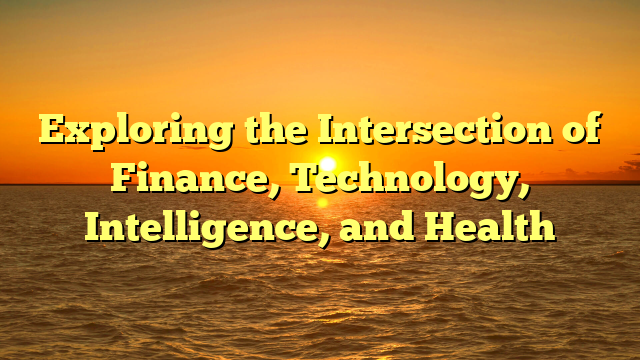In the modern world, the convergence of finance, technology, intelligence, and health has led to remarkable advancements that are reshaping society. These fields, although distinct, are increasingly interconnected, driving innovation and creating new opportunities. As we look towards the future, understanding how these sectors interact can provide insight into the evolving landscape of global development. In this article, we will explore the role of finance, technology, intelligence, and health, highlighting their synergies and potential for transforming lives.
—
Finance: The Backbone of Modern Economies
Finance is essential to modern economies, enabling the flow of capital and facilitating economic development. It encompasses various sectors such as investment, banking, and insurance that support the functioning of markets and ensure the efficient allocation of resources. One of the most important aspects of finance is fund distribution, which determines how resources are directed towards businesses, infrastructure, and innovation.
Financial technologies, also known as FinTech, have transformed the finance sector by introducing new ways to manage and invest money. Technologies like blockchain, AI, and machine learning have created new possibilities for automating transactions and improving transparency in financial markets. This, in turn, has made financial services more accessible, efficient, and secure.
The rise of digital currencies, including Bitcoin and Ethereum, has brought both challenges and opportunities to the financial world. While these currencies promise to reduce transaction costs and offer greater privacy, they also raise concerns related to security and regulation. The regulatory environment for digital currencies is still evolving, and governments around the world are working to strike a balance between innovation and control.
—
Technology: Driving Innovation Across All Sectors
Technology is undoubtedly one of the most powerful forces shaping the future From artificial intelligence to the Internet of Things (IoT), technological advancements are not only improving industries but also enhancing quality of life One of the key drivers of technological change is the rise of artificial intelligence and machine learning, which are being applied in almost every sector imaginable. These technologies are enabling machines to process large amounts of data and make decisions with minimal human intervention, leading to greater efficiency and innovation.
For example, in healthcare, AI is dramatically transforming how diagnoses and treatments are handled. Algorithms can now analyze medical images with greater precision than human doctors, improving early detection of diseases such as cancer. Additionally, AI tools are streamlining the discovery of new drugs and enabling personalized treatment options. These advancements are saving lives and reducing the cost of healthcare services.
However, as technology continues to evolve, there are concerns about its impact on privacy and employment With the increasing use of AI and IoT, personal data is being collected on an unprecedented scale, leading to questions about how this data is stored, protected, and used. Moreover, automation is threatening to replace many low-skilled jobs. This has sparked debates about the need for retraining programs and the role of governments in managing these transitions.
—
Intelligence: The Key to Problem Solving and Innovation
Human intelligence, coupled with technological advancements, is at the core of solving the world’s most pressing challenges Whether it’s tackling complex issues or driving new ideas, intelligence fuels innovation., the ability to think critically and adapt to new situations is what sets humanity apart from other species. In finance and technology, intelligence helps in making informed decisions and driving breakthroughs that enhance systems and products.
Moreover, cognitive abilities and emotional intelligence are essential in the healthcare sector Doctors, nurses, and healthcare professionals not only need technical knowledge but also the ability to empathize with patients, making emotionally intelligent decisions that improve outcomes. By combining human intelligence with technology, we have the potential to create revolutionary solutions to global challenges.
Furthermore, there is growing interest in enhancing cognitive abilities through the use of brain-computer interfaces (BCIs) BCIs have the potential to help people with neurological disorders, such as Parkinson’s or spinal cord injuries, by enabling them to interact with technology through thought alone. This breakthrough could revolutionize healthcare and provide new ways to enhance human capabilities.
—
Health and Wellness in the Age of Technology
Health is arguably the most important aspect of human life, and its connection with finance, technology, and intelligence cannot be overstated Advances in medical technology have drastically improved our ability to diagnose, treat, and prevent diseases. Innovations such as telemedicine, wearable health devices, and robotic surgery are making healthcare more accessible and efficient. webini33 daftar has also benefited from technological innovations, with mental health apps providing immediate support and therapy for users.
The role of technology in healthcare goes beyond just tools; it is about enhancing the overall quality of life. The integration of technology in healthcare systems promises to reduce medical errors, streamline administrative processes, and improve patient care. From electronic health records to AI-powered diagnostic tools, these innovations are improving both the speed and accuracy of medical services.
Despite these advancements, a balanced approach is needed where technology supplements, rather than replaces, human care. Technology should be seen as a tool to assist medical professionals, not a substitute for human interaction and empathy. It is essential that the healthcare industry maintains a human-centered approach to ensure the best possible outcomes for patients.
—
Conclusion: The Future of Finance, Technology, Intelligence, and Health
Looking ahead, the interconnection between finance, technology, intelligence, and health will deepen and evolve. The ability to harness the strengths of each sector will determine the trajectory of progress and innovation in the coming years. By leveraging advances in these areas, we can create a world where everyone has access to better healthcare, financial security, and opportunities for intellectual growth.
The key to a successful future will be integrating human intelligence with the power of technology., fostering a culture of collaboration and innovation that transcends traditional boundaries. As we continue to explore the potential of these sectors, it is clear that the future holds exciting possibilities for progress in every aspect of human life.
